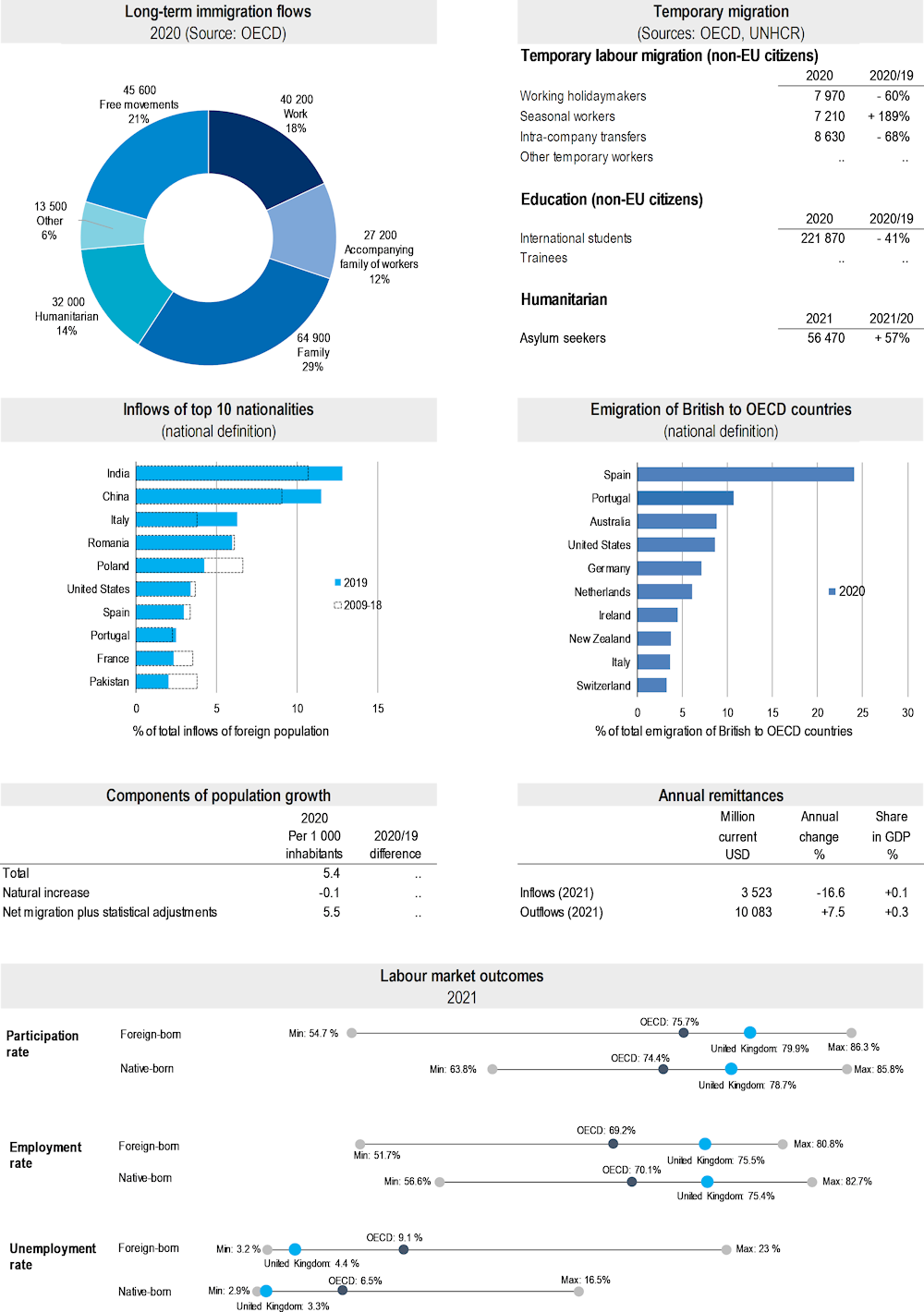In 2020, the United Kingdom received 223 000 new immigrants on a long-term or permanent basis (including changes of status and free mobility), ‑35.5% compared to 2019. This figure comprises 20.4% immigrants benefitting from free mobility, 18% labour migrants, 41.2% family members (including accompanying family) and 14.3% humanitarian migrants. Around 222 000 permits were issued to tertiary-level international students and 24 000 to temporary and seasonal labour migrants (excluding intra-EU migration). In addition, 62 000 intra-EU postings were recorded in 2020, a decrease of ‑53% compared to 2019. These posted workers are generally on short-term contracts.
In 2021, the number of first asylum applicants increased by 57% to reach around 56 000. The majority of applicants came from Iran (10 000), Iraq (7 700) and Eritrea (5 000).The largest increase since 2020 concerned nationals of Iran (6 250) and the largest decrease nationals of Pakistan (‑370). Of the 24 000 decisions taken in 2021, 62% were positive.
In May 2021, the United Kingdom set out its border control strategy for subsequent years. It envisages a digital control system with a universal permission to travel requirement and a more flexible approach to recruitment from overseas for skilled jobs with an identified national shortage. Particular attention was paid to changing the asylum system to deter illegal entry.
For economic migrants, a series of changes and new routes have been announced. These include the introduction of a Health and Care Worker route in August 2020, a new Graduate route in summer 2021, and in spring 2022, a new High Potential Individual route was introduced. Changes were also made to the quota-based Seasonal Worker visa to allow for a temporarily extension to include poultry workers in November 2021 and will again be extended to poultry workers in the run up to Christmas 2022. A new Scale‑up route will be operational from summer 2022, allowing high-growth companies to sponsor workers in high skilled roles. The Tier 1 (Investor) route was closed in February 2022.
In January 2022, the Afghan Citizens Resettlement Scheme (ACRS) opened and will provide up to 20 000 Afghan women, children, and others most at risk with a safe and legal route to resettle in the United Kingdom. It is separate from the Afghan Relocations and Assistance Policy (ARAP) which offers relocation to the United Kingdom for eligible Afghan citizens who were employed by the UK Government locally in Afghanistan in exposed, meaningful or enabling roles, and assessed to be at serious risk because of their work.
The Nationality and Borders Act was passed in April 2022. Its main aims are to deter illegal entry into the United Kingdom, break the business model of people‑smuggling networks, and speed up the removal of those with no right to be in the United Kingdom. It puts into law that those who arrive in the United Kingdom and who are granted refugee status having travelled through a safe third country where they could have reasonably been expected to claim asylum, or did not claim asylum without delay, may be deemed to have entered illegally and can be considered inadmissible to the United Kingdom asylum system. Other measures include tougher penalties for smugglers and new approaches to legal challenges and methods for age assessment.
In April 2022 the United Kingdom announced a new Migration and Economic Development Partnership with Rwanda. The partnership addresses the shared international challenge of irregular migration and intends to break the business model of people smuggling gangs. Under this partnership, those who travel to the United Kingdom by illegal and dangerous routes, including by small boat across the English Channel, and are deemed inadmissible to the United Kingdom asylum system, may be relocated to Rwanda where they will have their asylum claim considered. Those whose claims are accepted will then be supported to build a new life in Rwanda.
In response to the war in Ukraine, special visa-controlled schemes for Ukrainian refugees were opened in March 2022 including the Ukraine Family Scheme and the Homes for Ukraine Scheme.
For further information: www.gov.uk/government/organisations/home-office | www.ons.gov.uk

